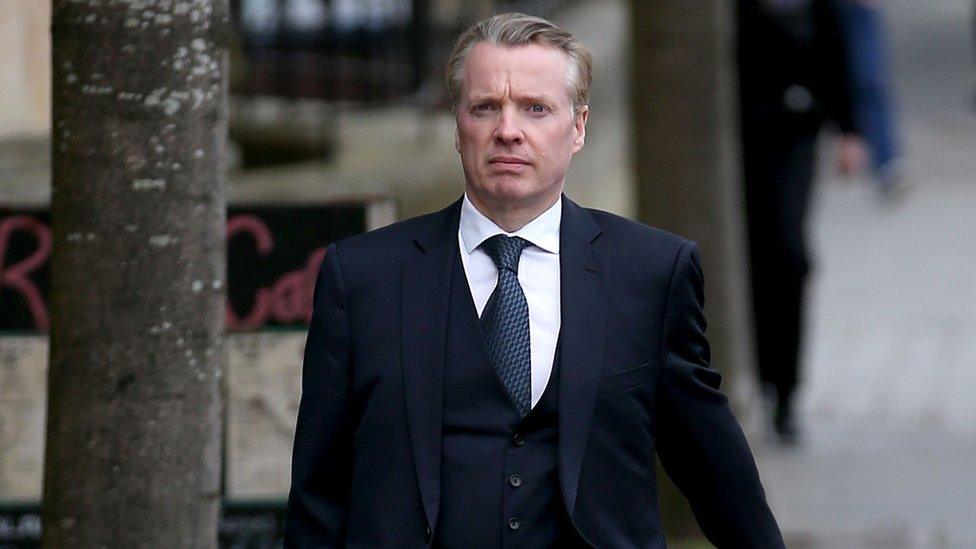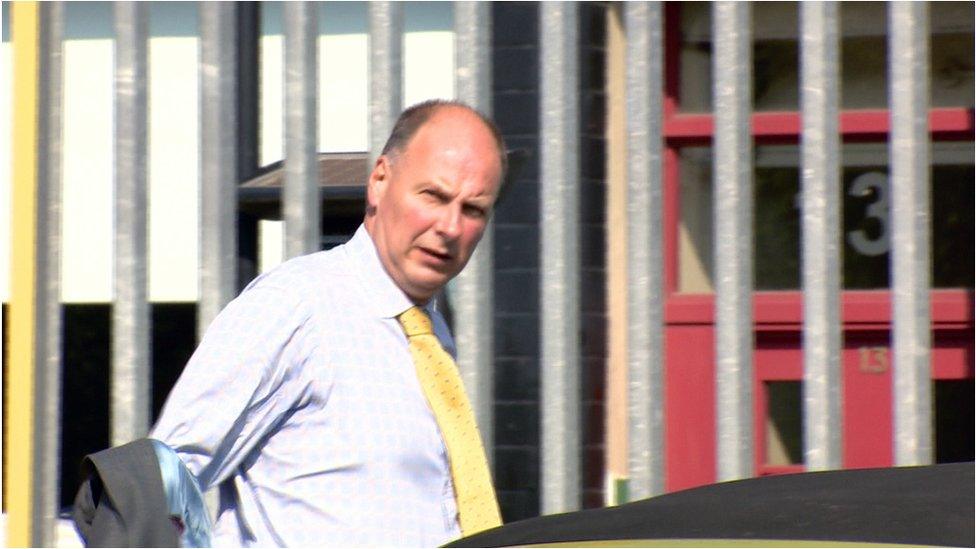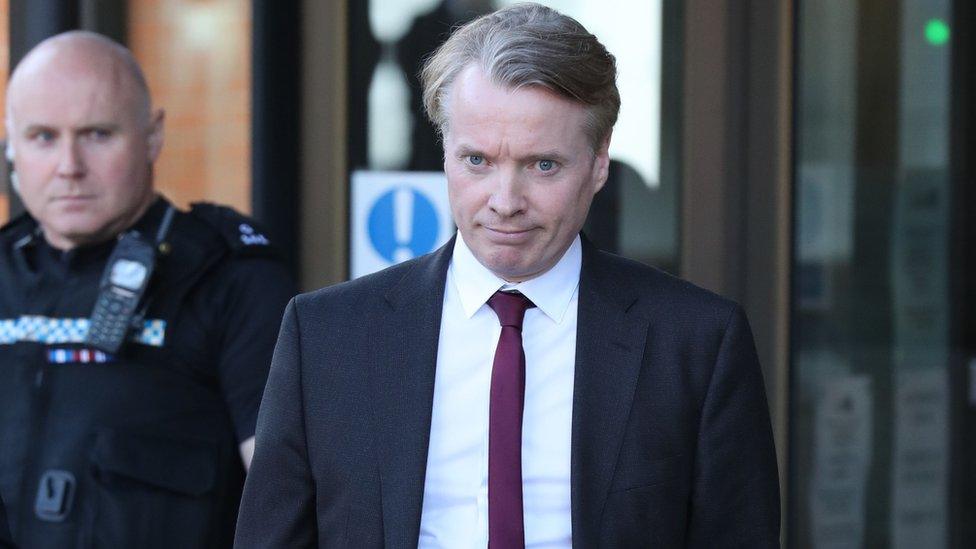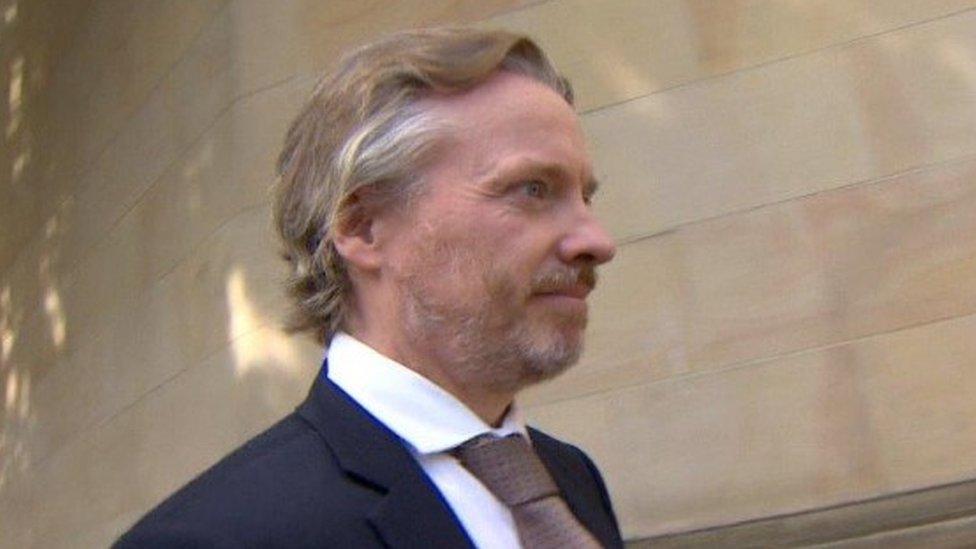Craig Whyte Trial: David Murray 'benefited' from Rangers sale
- Published

Former Rangers owner Sir David Murray sold the club to Craig Whyte for £1
The former owner of Rangers, Sir David Murray, benefited from the sale of the club, a court has heard.
Sir David, who famously sold the Ibrox side for £1 to Craig Whyte, was told by Lloyds Banking Group that he could retain ownership of his metals business if he sold Rangers and reduced the club's debts.
Mr Whyte is accused of a fraudulent acquisition of Rangers.
He denies a charge of fraud and another under the Companies Act.
The High Court in Glasgow heard a second day of testimony from Ian Shanks, a relationship director with Lloyds Banking Group.
During cross-examination with Craig Whyte's defence QC, Donald Findlay, Mr Shanks said the bank had told David Murray that he could split Murray Metals from his wider company interests and retain ownership of the business on the condition that he sold Rangers and repaid its debts.
The court heard claims that the metals business was important to Sir David as it was where the tycoon made his fortune.
In an email dated from April 2010, Mr Shanks wrote: "When we did the Murray Group restructuring last year, we agreed that the metals business could be 'spun out' to David once he sold his shares in Rangers."

Craig Whyte denies a charge of fraud and another under the Companies Act
The court was told that the bank gave Sir David a year to sell the Ibrox side and pay off its debts, which included an £18m overdraft.
Donald Findlay put it to Mr Shanks that: "That's an incentive, surely, to get the deal done."
Mr Shanks replied: "I agree."
The trial was later told of a draft letter written by Alastair Johnston, who was then chairman of Rangers, for Mr Shanks in January 2011.
In the letter, Johnston claimed the Rangers board were "masquerading as directors", effectively "stooges" for the "objective" of the bank.
He then insisted Lloyds wanted to "drain every single penny out of the club... to the extent Rangers as a thriving concern would be throttled into submission".
The then chairman spoke of "carnage" and referred to the "impoverished remains" of the club.
He also described the "head count" of the playing squad as "dangerously under water".
'Financial disaster'
The banker told the court he did not remember receiving the letter.
But, Mr Findlay asked: "The approach of Alastair Johnston was 'this was everybody's fault, but mine'?"
Mr Shanks: "That is a fair assessment."
The QC suggested Johnston had been presiding over a "financial disaster".
Mr Shanks said the club had been in "difficult circumstances", but that it was "still operating".
The court was also told of contact between Mr Shanks and then Rangers chief executive Martin Bain in 2010.

Ian Shanks was giving evidence at the High Court in Glasgow for a second day
There was mention of the transfer of striker Nikica Jelavic to Rangers from Rapid Vienna.
It was said the Austrian club "required the balance of transfer funds" to be "cash backed".
Rangers wanted to facilitate this by "seeking to increase the funding from Ticketus" - but that there was to be no mention of the firm on the year-end accounts.
Mr Findlay asked: "They hid the use of Ticketus?"
Mr Shanks: "Yes."
Prosecutors allege Mr Whyte pretended to Sir David Murray, and others, that funds were available to make all required payments to acquire a "controlling and majority stake" in the club.
The Crown alleges Mr Whyte had only £4m available from two sources at the time but took out a £24m loan from Ticketus against three years of future season ticket sales.
The court has heard the sale was eventually made to Mr Whyte for £1 but came with obligations to pay an £18m bank debt, a £2.8m "small tax case" bill, £1.7m for stadium repairs, £5m for players and £5m in working capital.
The second charge under the Companies Act centres on the £18m payment between Mr Whyte's Wavetower company and Rangers to clear a bank debt.
The trial before eight men and seven women continues.
- Published25 April 2017

- Published24 April 2017

- Published21 April 2017

- Published20 April 2017
